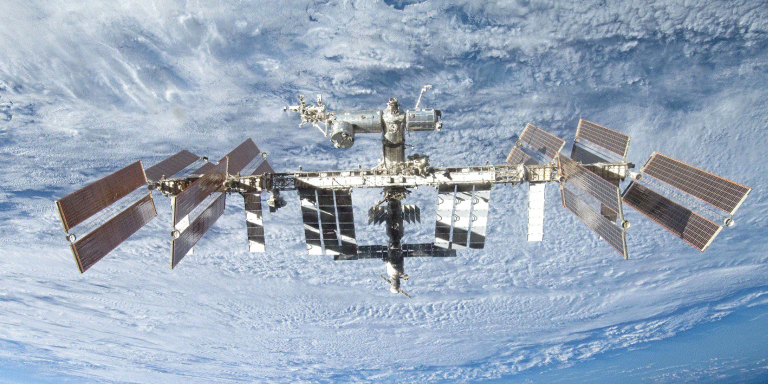
On Monday, April 4, Thales Alenia Space, a joint venture between Thales (67%) and Leonardo (33%), announced a strategic collaboration with Microsoft to explore new capabilities in Space Edge Computing (SEC), artificial intelligence space observation tools (DeeperVision) and the digital ground segment. To that end, the two companies will demonstrate and validate computing technologies and capabilities in orbit aboard the International Space Station (ISS) in 2023.
Thales Alenia Space architects design and deliver high-tech solutions for telecommunications, navigation, Earth observation, environmental management, exploration, science and orbital infrastructure. They have built modules for the International Space Station.
Just one year ago, on April 6, 2021, Thales Alenia Space and Microsoft announced their decision to innovate together in the field of satellite-based cloud technologies, by adding the DeeperVision automated image processing solution, developed by Thales Alenia Space, to Microsoft’s Azure Orbital platform. This partnership combined DeeperVision’s capabilities to process data streams and generate timely information with Azure Orbital’s cloud capabilities. The insights are powered by high-speed, high-volume artificial intelligence (AI) and machine learning (ML).
Demonstrating the benefits of Space Edge Computing
This new collaboration aims to provide advanced connectivity, analytics and computation in space through Space Edge Computing. In 2023, the companies will demonstrate and validate the technologies and computing capabilities in orbit on the ISS. Thales Alenia Space will deploy a powerful in-orbit computer, an in-orbit application framework, and high-performance Earth observation sensors to develop new applications for processing climate data in orbit to benefit the sustainability of our planet.
Researchers from Thales Alenia Space and Microsoft Research will work in the fields of remote sensing, computer vision and climate science to demonstrate the potential of next-generation on-orbit computing for Earth observation. With this edge-of-space computing capability, Earth observation information will be delivered directly and immediately applicable for monitoring, understanding and protecting our planet.
Space Edge Computing demonstration on the ISS
Thales Alenia Space will deploy an enhanced space edge computing payload running Azure onboard the International Space Station. Thales Alenia Space in Spain will be responsible for the development and delivery of the payload to the ISS, while Microsoft will be responsible for the on-orbit software framework and the Space Software Development Kit (SDK). The on-orbit testbed will include onboard hardware developed by Thales Alenia Space in Spain as well as data collection sensor systems. This demonstration will enable application developers to easily develop and deploy Earth observation data processing applications on a real working environment, at the crossroads of the space and cloud worlds.
Democratizing space observation
Thales Alenia Space and Microsoft want to democratize space observation by bringing accessible AI space observation tools (such as DeeperVision) to the market for developers. In addition, the two companies want to accelerate the deployment of ground stations and increase the reach of connectivity. To this end, they will develop and market a joint managed service proposal to provide ground station virtualization and the as-a-service model.
Hervé Derrey, CEO of Thales Alenia Space, said:
“Thales Alenia Space and Microsoft are taking their vision of a seamless world between space and digital even further by demonstrating the benefits of space edge computing for their customers soon. Thales Alenia Space is particularly proud to be at the forefront of innovation by combining its expertise with a reference partner like Microsoft to unlock new markets, including the processing of climate data in orbit to better protect our planet. The comprehensive MOU strengthens our relationship with Microsoft on the path to digital space.”
Tom Keane, Corporate Vice President, Mission Engineering at Microsoft added:
“After our initial collaboration to integrate DeeperVision software into Azure Space, we are taking the next step with Thales Alenia Space by demonstrating on-orbit computing running on the Microsoft Cloud. This offers immediate practical applications for climate change research and opens the door to opportunities that extend far beyond space.”
Translated from Thales Alenia Space va tester avec Microsoft le « edge computing » à bord de la Station Spatiale Internationale









